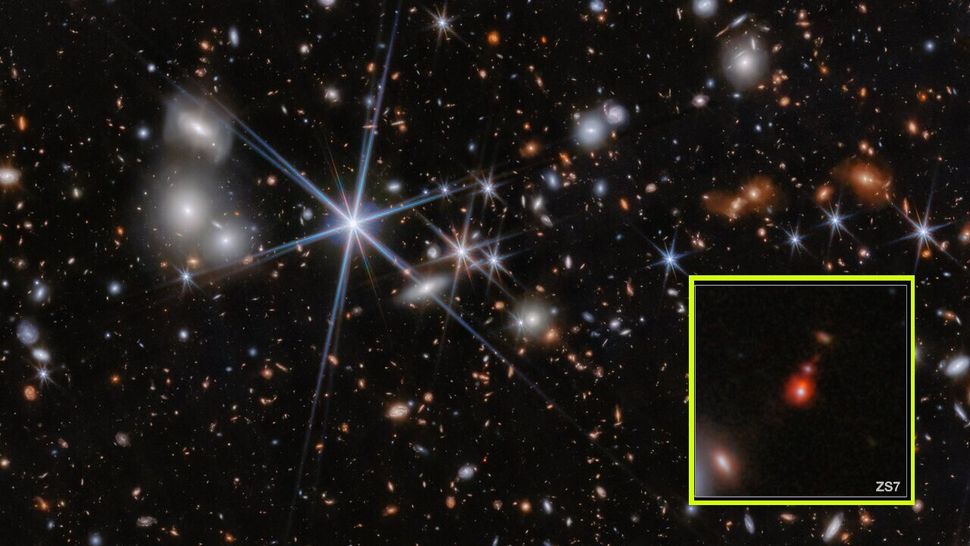Science
Related: About this forumJames Webb telescope spots 2 monster black holes merging at the dawn of time, challenging our understanding of the unive
By Brandon Specktor published 5 hours ago
New observations with the James Webb Space Telescope reveal the most distant pair of merging black holes ever spotted. The discovery further challenges leading theories of cosmology.

This image shows the environment of the galaxy system ZS7 as seen by the James Webb Space Telescope. A zoomed-in look at the merging black hole system is inset in yellow.
This image shows the environment of the galaxy system ZS7 as seen by the James Webb Space Telescope. A zoomed-in look at the merging black hole system is inset in yellow. (Image credit: ESA/Webb, NASA, CSA, J. Dunlop, D. Magee, P. G. Pérez-González, H. Übler, R. Maiolino, et. al)
Astronomers have used the James Webb Space Telescope (JWST) to detect the most distant pair of colliding black holes in the known universe. The cosmic monsters — each estimated to be as massive as 50 million suns — have been detected more than 13 billion light-years away, at a time just 740 million years after the Big Bang.
While not the biggest or oldest black holes ever detected, the merging pair have still managed to grow bafflingly large for such an early time in the universe's history, the study authors said in a European Space Agency (ESA) statement. This discovery further challenges leading theories of cosmology, which fail to explain how objects in the universe's infancy could grow so large, so fast.
"Our findings suggest that merging is an important route through which black holes can rapidly grow, even at cosmic dawn," the study’s lead author Hannah Übler, a researcher at the University of Cambridge, said in the statement. "Together with other Webb findings of active, massive black holes in the distant Universe, our results also show that massive black holes have been shaping the evolution of galaxies from the very beginning."
Black holes are extraordinarily massive objects with a gravitational pull so strong that nothing, not even light, can escape their clutches. They are thought to form when massive stars collapse in supernova explosions, and they grow by endlessly swallowing up the gas, dust, stars and other matter in the galaxies that surround them.
More:
https://www.livescience.com/space/black-holes/james-webb-telescope-spots-2-monster-black-holes-merging-at-the-dawn-of-time-challenging-our-understanding-of-the-universe
DJ Porkchop
(463 posts)PJMcK
(22,139 posts)As the video played, my tablet began vibrating violently then shut down.
Weird.
Sent from my iPhone.
Judi Lynn
(160,847 posts)Joinfortmill
(14,650 posts)keithbvadu2
(37,317 posts)I cannot even comprehend the old astrophysics stuff, much less the new theories and exceptions.
I just read it in awe.
Dumb it down enough that I can still be impressed.